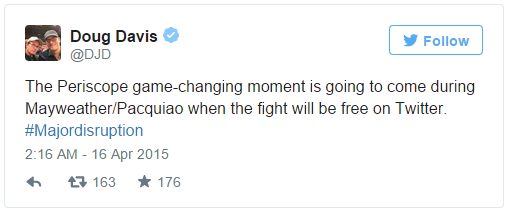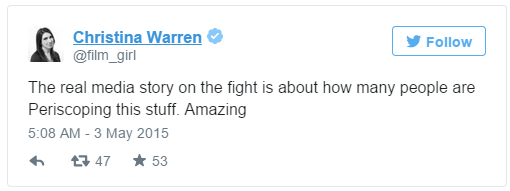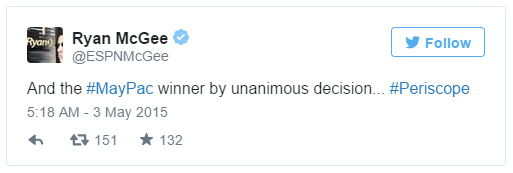
Live video streaming by ‘Periscope Pirates’ threatens broadcast rights
“What is the future for apps such as Periscope and Meerkat in a world where live content has value?”
Kevin Poulter, a British lawyer specialising in intellectual property, asks the question as broadcasters, producers and promoters struggle to contain their growing concern:
How to prevent the live streaming of huge entertainment events via mobile phones?
If you’re a regular reader of our monthly post, In The Frame... (if you’re not familiar with it, it’s a neat round-up of the month’s broadcast-related news), you may remember something about Periscope, the live video streaming app bought by Twitter, which we talked about in the March edition.
“…looks set to disrupt a rapidly-changing broadcast industry,” we said in that post.
Two months on and that disruption appears to be gathering pace, with the recent Mayweather/Pacquiao fight serving as an early indicator of what could become a huge problem for promoters and content producers.
Doug Davis, an American music industry executive, entertainment lawyer and sports agent, tweeted this to his 207,000 followers (a lot more than Periscope has, at the time of writing):

And this tweet was from Christina Warren, Senior Tech Correspondent at Mashable, as the fight was taking place:

(Read about Christna’s experience of watching the fight via Periscope here).
Periscope is available as an iOS app as well as on Twitter and allows you to watch and broadcast live video from anywhere in the world – anything from a walk in the woods to a protest in Egypt.
How does Periscope work?
You need a Twitter account in order to shoot via Periscope and users can choose whether or not to make their video public or viewable only by a chosen group, such as friends or family.
Viewers can show their appreciation of a broadcast by sending ‘hearts’ to the broadcaster by tapping on the mobile screen (similar to liking an image on Instagram).
A Most Loved List appears under the People tab that shows the users who have received the most hearts during a live broadcast.
While Meerkat, a similar app, has no ability to save live streams (although there are third-party apps that can help with that) Periscope saves them for up to 24 hours. Videos can also be saved to the users’ phones.
“For viewers, Periscope gives you a new set of eyes and ears. Travel the world and step into someone else’s shoes. See what they see, hear what they hear, and hopefully feel what they feel. Watching a broadcast isn’t a passive experience like television. On Periscope, viewers influence the broadcaster by sending messages, and expressing their love by tapping the screen to send hearts.”
Kevin Poulter discusses ‘Periscoping’ high-value entertainment
Kevin Poulter recently appeared on Arise News, an independent 24-hour news and entertainment channel, to discuss the future of mobile broadcasting.
Live streaming from smartphones of the Mayweather/Pacquiao fight – which had been described by many in the build-up as “the fight of the century” and was one of the biggest pay-per-view events in history – is thought to have “cost [broadcasters] millions of dollars”.
British boxing fans could watch the Las Vegas bout on Sky Sports for £19.99 while US broadcasters Showtime and HBO offered it to the huge and lucrative American audience for between £59 and £66 ($89.99 – $99.99).
“What’s interesting here, particularly in Europe,” says Poulter, “is that sports entertainment isn’t normally protected by copyright law. It’s not something that’s ‘rehearsed’ or ‘creative’, say the courts, so therefore it’s unlikely to be protected.
“What is protected, though, is [an event’s] potential to be broadcast, and the extra elements that go around that, so it’s going to be an interesting debate.”
‘There is a threat to rights-based sports and entertainment’
Once the ability to search is developed by Periscope, Poulter suggests, it’s going to become an even bigger issue.
Also, the matter is further complicated when you consider that HBO themselves – who paid millions of dollars for the right to transmit the fight – wanted to get in on the act and use Periscope to show behind-the-scenes footage, which they could of course have done using more traditional methods.
How Periscope users succeed – and attract 10,000 viewers from one phone
Poulter: “What people tend to do is not give these streams an accurate name. And, during the Mayweather fight particularly, there were people saying, ‘Don’t like this’, ‘Don’t heart it’ – as you do on Periscope – ‘We don’t want to draw attention to the fact that this is being done’.
“Yet there was one there, I think a Spanish stream, with 10,000 viewers from one phone. When we’re looking at those sorts of statistics, somebody ultimately is going to get caught out.”
Even if streams from big events are of poor quality, many people simply want to be part of such events but without spending what might feel like an unjustifiable sum to watch an official broadcast.
Here’s the interview in full:
The Premier League, the NBA, MLB, NHL and NFL
The potential legal liability for content delivered via Periscope is now under close scrutiny and other major rights holders are monitoring the situation closely.
Indeed, there have been reports that large right holders such as sports broadcasters and Hollywood studios have taken legal action against Periscope for users who film content direct from TV or events via their smartphone.
In America, the NFL recently reminded journalists that ‘any unauthorised use of any transmission, picture or other depiction or description of game action, game information, player interview or other arena activity is prohibited… without prior written approval.’ (source)
But while those powerful sporting institutions might be able to impact streaming of their events via a spectator (or, more likely, spectators), it’s much more difficult for them to influence people using their phones to broadcast events from their TV.
‘We respect the intellectual property rights of others and expect Periscope users to do the same’ – Periscope’s terms of service
Periccope has a dedicated content review team but also relies on users’ reports of infringements.
“We will respond to notices of alleged copyright infringement that comply with applicable law and are properly provided to us,” the company says, adding that it “has the right to remove any illegal content and shut down a person’s account if they are found to be violating the TOS.”
The future of live video streaming
While Periscope’s terms of service specifically prohibit the broadcasting of copyrighted content without permission, they – nor the broadcasters and other rights holders – cannot ignore the public’s appetite for sharing premium content, rightly or wrongly, and general apathy towards copyright law.
Think of all the movie streaming sites that exist, not to mention the big social networks and countless websites that carry material that’s ‘protected’ by copyright law but published by millions of people with neither compensation nor attribution on their mind.
It’s a problem for the big players that looks set to rumble on and we watch with interest to see how they deal with the ‘periscope pirates’.
As for the Mayweather/Pacquiao fight:

Further reading
Stay up to date with this story as and when we publish more by joining us on Twitter and/or LinkedIn. Alternatively, get in touch with us here at Frame 25, directly.

In The Frame - April '23

In The Frame - March '23
